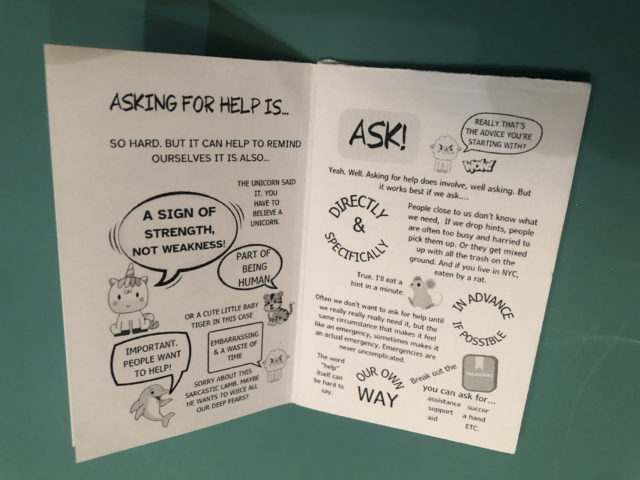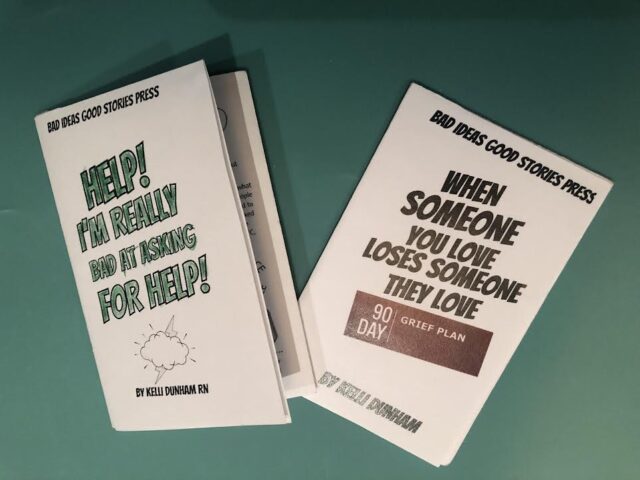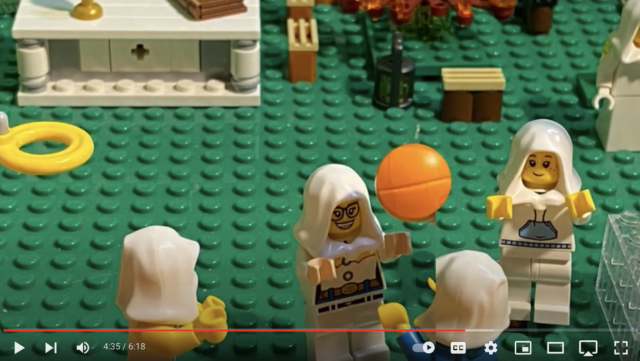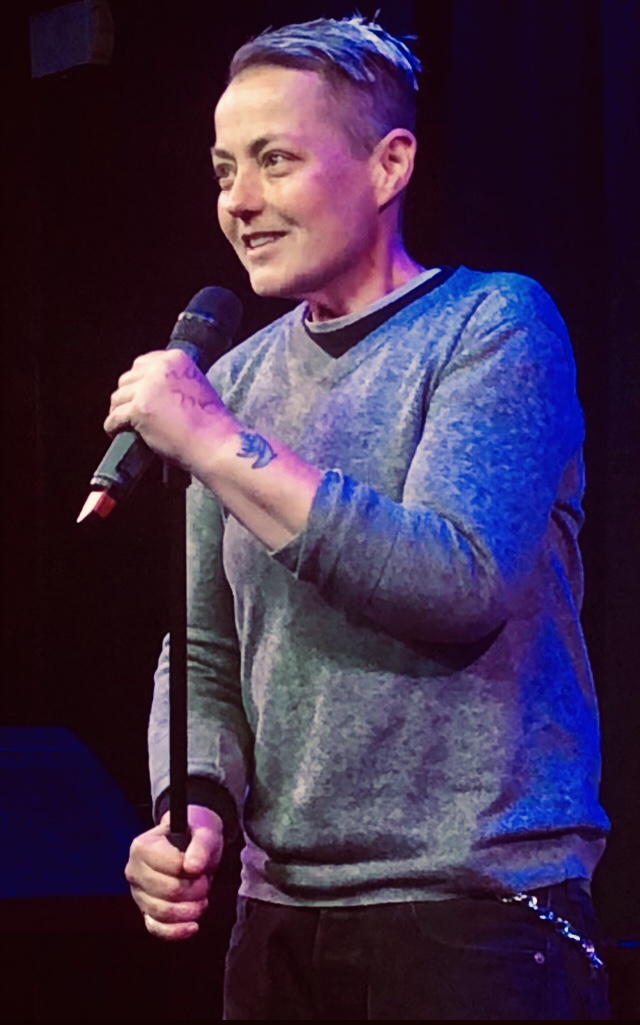Accidental enemy of Mother Teresa. Two time widow before age 40. Victim of an exploding knee replacement. Kelli’s Dunham‘s comedy show Second Helping promises a plate full; and it delivers, minus actual nun on nun action (sorry to disappoint). The drop dead funny show is enjoying its second run at the East Village’s Caveat after a successful summer run at a gay bar in Edinburgh.
I attended Second Helping on a rainy night earlier this month, metaphorical church bells echoing through the dim downtown comedy club. As fellow Midwesterner and with 12 years of Catholic school under my belt plaid skirt, I’m all about nuns and couldn’t wait to hear Kelli’s story. Before the show, I ran into the convent drop-out while she was earnestly preparing mini-brochures entitled, “Help, I’m Really Bad At Asking For Help!”. She placed them on tables with crayons for coloring the cartoons inside, like the unicorn who says that asking for help is “a sign of strength, not weakness!” You have to believe a unicorn.

Kelli’s sister, Elizabeth Dunham Toner, RN, opened the show, matching the vibes of the weather with colorful tales of cumulonimbus clouds and tornado drills in rural Wisconsin – in the context of growing up with parents with evangelical leanings who forbade snacks, except popcorn and “pop” on Sundays. Both Kelli and Elizabeth are products of a home atmosphere that could rival the storminess of meteorological happenings – a childhood that instilled a “pull yourself up by your bootstraps” ethos, or as Kelli puts it:
“My parents thought that anytime you let anyone help you, that was just revealing some kind of weakness that might possibly be fatal.”
Self-reliance might have been the religion she grew up with, but in her early 20’s, Kelli turned to Catholicism during a period of malaise, drawn to the opportunity to work alongside the Missionaries of Charity at the Home for the Dying.
“I loved the way they move so silently on stairs, the way they work together in hard manual labor, and how that hard manual labor left their forearms well-muscled…” The former “Sister Mercy” has the audience swooning.
But this nunnery is no laughing matter. Kelli explains that bells ring at 4:40am, and meals of donated food are meager – tea and (sometimes moldy) bread with oil for breakfast, rice topped with protein for lunch, and soup in the eve.
It took Kelli one-and-a-half-years to realize that things weren’t working out. So like any binary polyamorous queer on the precipice of coming out, Kelli got therapy, a cat, a bad tattoo of a marine mammal and set out to rebuild her life. But she couldn’t have prepared for the heartbreak that laid ahead.
Obviously, the show is hilarious. But it’s more than that. Kelli takes care to do some “housekeeping” at the onset to let us know that death will pay a visit before the night is through. Not once, but twice. But we’ll be okay. She means it. Somehow I trust her.
Divine appointments or coincidence, Kelli’s life path has afforded her ample opportunity to apply her skillset, and heart set, especially when faced with the loss of two partners to cancer.
Kelli met burlesque performer and activist, Heather MacAllister in 2005. They moved to Oregon, where they made a home together in a converted Krishna temple. Six months into the relationship, ovarian cancer, once in remission, struck again. Not leaving anything to chance, the couple saved pennies for a pilgrimage to the healing waters of Lourdes France, a happening spot for fans of the Virgin Mary. But when chemo stopped working and the pain became unbearable, Heather wanted to know she’d have some control over how she’d bring her lifetime to completion.
They navigated the complexities of paperwork, prescriptions and lethal medication. Heather wanted to die surrounded by the friends who loved her, and opted for medical aid in dying – legal in Oregon and currently under legislative consideration in New York.
“In the Missionaries of Charity, I had been exactly the wrong person. But here I was getting to be exactly the right person, at exactly the right time… how many people ever in their life get that choice?” Kelli reflects from the stage.
Heather also made Kelli promise that the former nun would accept help after she was gone. “When somebody you love is dying, you say ‘yes’ – a lot,” Kelli tells her audience.
Four years after Heather’s passing, Kelli met the writer, Cheryl Burke. One and a half years into their relationship, Cheryl called Kelli from a physician’s office. What she had thought to be asthma turned out to be a cantaloupe-sized tumor from Hodgkin’s lymphoma, which normally has pretty good survival rates. Cheryl turned to Kelli, “How come men always have to get their tumors compared to sports balls, and women’s tumors have to be compared to fruit?”
Testing, chemo, radiation and a series of ups and downs followed. As damage to Cheryl’s lungs worsened, Kelli was able to stay in the hospital with her – thanks to short legs that allowed for sleeping on the radiator plus an army of good friends who made sure her hand was never lacking Diet Mountain Dew.
“People like to help,” Kelli repeats her mantra at the mic. “It takes an almost courageous level of vulnerability to accept help, even or perhaps, especially when you really need it.”

Learning to accept help has been a work in progress. Five years ago, she had a medical crisis when a knee replacement turned bad – a fix, she admits, that owed its origins to those convent rituals of kneeling four hours a day on concrete. A raging knee infection presented a chance to see how much her ability to accept help had evolved. Reluctant to go to the ER, a friend laid it bare: “But if you’re allowed to help me, and I’m not allowed to help you, what does that really say about what you feel about people who need help?”
Today, the comedian who got her start telling jokes to cows as a kid, brings her humor to performance spaces and presentation halls where she reaches students, caregivers, victim advocates – any space where she can “help the helpers.” Kelli also works with medically-fragile kids, writes a substack gazette, and has penned seven humorous non-fiction books including, The Boy’s Body Book and The Girl’s Body Book which have been translated into dozens of languages.
You might think maintaining grounding would be difficult for someone immersed full-time in conversations around trauma, grief, and dying. Kelli attributes her positivity to the ability to remember mostly “the good.” It’s what her therapist calls “deep biological optimism”.
“I really only remember [the good] things which isn’t great for decision making, but it’s really good for mental health,” she says.
She is more likely to remember how nice her friends were, as opposed to the pain of temporarily swapping out a knee replacement for a cement implant filled with antibiotics. And she finds a singular joy in this memory – a rare time when her fellow nuns cut loose. Sister Carmel found a basketball and set out to recruit nuns for a pick-up game at a retreat center.
“I don’t know how but I’ll try…it’s beautiful to try!” said one Colombian sister. Next thing, the tiny nun was dribbling the ball behind her back. “I thought you didn’t know how to play?” Kelli recalls asking her. “I don’t know,” the sister coyly replied. “Well…maybe a little defense.”
“The sisters played basketball like they did everything – with their whole heart,” Kelli says. She memorialized the day they kicked ass in a stop action video on YouTube.

Today, Kelli still values community and a sense of purpose. The stage is her sanctuary and her mission is making us laugh.
Second Helping defies categorization and that’s part of its charm. It stretches across genres: Comedy that fits snugly in a cabaret lounge meets storytelling à la The Moth. Ultimately, Second Helping is an invitation for us to accept help and help those we love.
DON’T MISS! Second Helping at Caveat comedy theater, 21A Clinton Street New York, NY. Remaining shows: April 22 at 7pm, May 18 at 4pm (virtual access option in May). Produced by Beth Lapides.


What Do You Think?